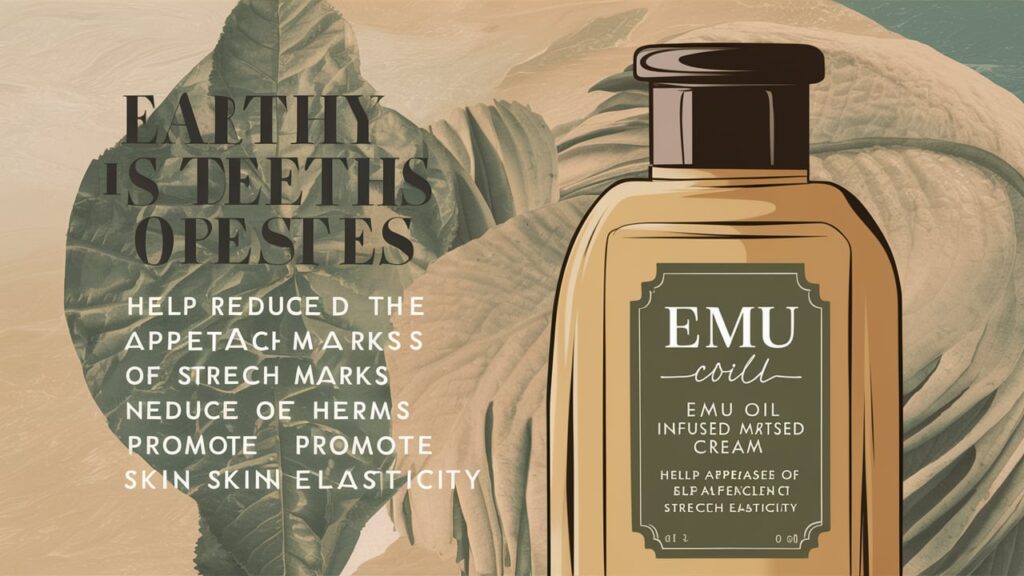- Some users report positive results using emu oil for stretch marks, citing improved skin texture and flexibility.
- The scientific community has limited clinical evidence supporting emu oil’s effectiveness in treating stretch marks.
- Emu oil is valued for its deep moisturizing capabilities, which may help improve the appearance of stretch marks.
- More randomized controlled trials and long-term studies are needed to establish emu oil’s efficacy for stretch marks conclusively.
Emu oil is often spotlighted as a potential remedy for various skin conditions, including stretch marks. According to a study on Consumer Preferences for Products aimed at preventing and treating stretch marks, oils are the most commonly chosen form of treatment. But does the evidence back up the hype? Are consumers investing in a solution grounded in science, or are they chasing after an elusive dream?
Stretch marks, medically known as striae distensae, are a common concern for many people. They mostly appear during rapid growth, pregnancy, or weight changes.
While various treatments exist, the quest for an effective, non-invasive solution continues. Emu oil, derived from the fat of the emu bird, has been touted as a miracle cure by some, but what does the research say?
Natural Ingredients For Stretch Marks: Why They May Not Work
The Appeal of Emu Oil: What Consumers Are Saying
The allure of emu oil lies in its purported ability to penetrate deeply into the skin, offering intense hydration and potentially improving skin elasticity. Another study noted that patients have increasingly turned to emu oil for its moisturizing properties.
Anecdotal evidence suggests that emu oil can enhance skin texture and flexibility. It is, therefore, an appealing option for those looking to prevent or reduce the appearance of stretch marks.
Emu oil, which is non-comedogenic and rich in essential fatty acids, fits this bill perfectly. The combination of these properties makes it a popular choice, particularly among those who prefer a more holistic approach to skincare.
However, while the user testimonials are positive, it is important to distinguish between personal experiences and scientifically validated results.
The Science Behind Emu Oil: What We Know and What We Don’t
The scientific community remains cautious about endorsing emu oil as an effective treatment for stretch marks. The Consumer Preferences study highlights a gap in clinical evidence supporting the oil’s effectiveness. While it is used in stretch mark-specific products, insufficient scientific data confirms its efficacy.
Emu oil’s non-comedogenic nature, anti-inflammatory effects, and deep moisturizing capabilities are promising for improving skin texture and appearance. However, the focus is more on the formulation of skincare products rather than providing direct clinical evidence.
While emu oil is known for its ability to penetrate the skin’s layers, rigorous studies do not demonstrate its impact on skin elasticity or the reduction of stretch marks.
Most of the claims surrounding its effectiveness are based on consumer reports and anecdotal evidence, which, while valuable, do not meet the stringent criteria required for scientific validation.
Understanding Stretch Marks: Causes and Common Treatments
To fully appreciate the potential of emu oil’s potential, understanding what causes stretch marks and the common treatments available is essential. Stretch marks occur when the skin is stretched beyond its normal capacity, leading to the tearing of the dermis. This often happens during rapid growth, such as puberty, pregnancy, or significant weight gain.
Traditional treatments for stretch marks include topical retinoids, hyaluronic acid, and laser therapy. These treatments aim to increase collagen production, improve skin elasticity, and promote skin regeneration.
However, each option has drawbacks, such as irritation, the need for multiple sessions, or high costs. This is where natural oils like emu oil come into play, offering a more accessible and potentially gentler alternative.
Consumer Preferences: Emu Oil vs. Other Treatments
Given the myriad options for treating stretch marks, why do consumers gravitate toward emu oil? The Consumer Preferences study sheds light on this question, revealing that many prefer oils over creams or lotions due to their perceived naturalness and moisturizing ability. Emu oil, in particular, is favored for its unique composition that closely resembles human skin’s natural oils, making it more compatible and less likely to irritate.
However, consumer preference does not always align with scientific evidence. While emu oil is popular among users, the lack of robust clinical studies means that its purported benefits are not universally accepted by the medical community. This discrepancy highlights the need for more research to bridge the gap between consumer experiences and scientific validation.
The Need for Further Research: Bridging the Gap Between Anecdotal and Scientific Evidence
Despite its widespread use, emu oil’s effectiveness in treating stretch marks remains largely anecdotal. The studies and patents available suggest that while emu oil has beneficial properties, more rigorous research is needed to establish its efficacy conclusively. Randomized controlled trials, long-term studies, and comprehensive reviews would provide the necessary evidence to support or refute the claims surrounding emu oil and stretch marks.
A Balanced Perspective: The Pros and Cons of Using Emu Oil for Stretch Marks
Like any skincare product, emu oil has pros and cons. On the positive side, it is a natural, deeply moisturizing oil rich in essential fatty acids. Its non-comedogenic nature is unlikely to clog pores, and its anti-inflammatory properties can help soothe irritated skin. These attributes make it an appealing choice for those looking to improve their skin’s health and appearance.
However, the primary drawback is the lack of scientific evidence supporting emu oil’s effectiveness for stretch marks. While many consumers report positive results, these claims have not been rigorously tested in clinical settings.
Additionally, because emu oil is derived from animal fat, it may not be suitable for those following a vegan lifestyle or those concerned about its production’s ethical implications.

I’m a devoted organic skincare enthusiast, passionate about the natural, wholesome goodness that organic products bring to our skin.
Organic skincare isn’t just a hobby for me—it’s a lifestyle. Every product I use, recommend, and write about has been carefully chosen for its purity and effectiveness. Everything I write about is backed by scientific studies, dermatologists’ opinions, and user experiences.
I also excel at tackling skincare challenges with innovative, organic solutions.


